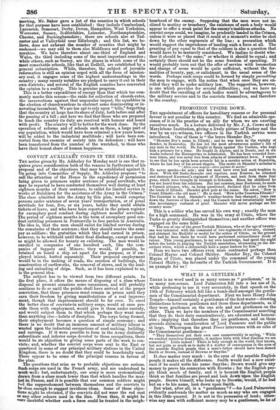CONVICT AUXILIARY CORPS IN THE CRIMEA.
THE notice given by Mr. Adderley for Monday. next is one that re- quires grave consideration both of the reasons in furtherance of his proposal and of the objections that may be established against it. On going into Committee of Supply, Mr. Adderley proposes "to call the attention of the House to the expediency of permission being given to prisoners under sentence of penal servitude, who may be reported to have conducted themselves well during at least eighteen months of their sentence, to enlist for limited service in works at Balaklava for the assistance of the Army in the Crimea." The class admitted into the Army by this plan, would comprise persons under sentence of seven years' transportation, or of penal servitude for four, five, or six years, before they could obtain tickets-of-leave, and who have been reported in the prison register for exemplary good conduct during eighteen months' servitude. The period of eighteen months is the term of exemplary good -con- duct entitling prisoners in Pentonville to free pardon in Australia. The idea is, that the men should enlist for limited service during the remainder of their sentence; that they should receive the same pay as soldiers; the gratuities which they had earned in prison, however, to be withheld until their final discharge, except so much as might be allowed for bounty on enlisting. The men would be enrolled in companies of one hundred each, like the com- panies of Sappers and Miners ; they would, if possible, be retained on board a ship set apart for the purpose, or if em- ployed inland, hutted separately. Their proposed employment would be in the making of roads, the erection of buildings, the construction of earthworks, the removal of stores, and in the load- ing and unloading of ships. Such, as it has been explained to us, is the general idea. , The subject has ,to be viewed from two different points. In the first place, it offers the means of disposing of a class whose disposal at present occasions some uneasiness, and will probably continue to do so until the public shall have arrived at the proper conviction, that those prisoners must remain in prison until they earn their freedom by giving manifestations of a real improve- ment, though that imprisonment should be for ever. To enrol the better class of convictirin military corps, would at once pro- vide them with employment, would give it them under custody, and would subject them to that which perhaps they want more then-anything else—habits of discipline. The corps being formed, their .employment becomes a question 'of simple economy; and there is no doubt that an immense amount of military labour is wasted upon the industrial occupations of road-making, building, and carriage. If it were possible to form in the Army distinctly subordinate and inferior corps devoted to those occupations, there would be iris objection to giving some parts of the work to con- victs; and, whether the convict corps were sent to the East or quartered in some of our principal military stations in the United Kingdom, there is no doubt that they could be beneficially used. These appear to be some of the principal reasons in favour of the plan. The questions that arise as to probable objections are serious. Such corps are used in the French army, and. are understood to work well; but, unfortunately, our army is more systematically drawn from a class much lower than that which handles the mus- ket in France, and it is possible that our common soldiers might =041 the rapprochement between themselves and the convicts to be close enough to suggest invidious ideas. Sonic of these objec- tions might be obviated, if the convicts did not wear the red coat or any other colours used in the line. Even then, it might be vary doubtful whether such a force could be trusted in the neigh- bourhood of the enemy. Supposing that the men were not in- clined to mutiny or treachery, the existence of such a body would appear to offer a weak point for the enemy's insidious attacks. No convict corps could, we imagine, be prudently landed in the Crimea, unless it were so placed that it could at a moment's notice be shot down by the other regiments of the line ; a precaution which would suggest the imprudence of landing such a force at all. The granting of pay equal to that of the soldiers is also a question that would have to be maturely considered. We incline to doubt whe- ther it should be " the same," or whether it should be equal; and certainly there should not be the same freedom of spending. It would probably turn out that the offer of service with locomotion and change of scene would be quite sufficient, without the for- malities of bounty, pay, or enlistment, in the usual sense of the words. Perhaps such corps could be formed by simply permitting the men to engage, with the notice that when once they are en- rolled they will be under military law. The suggestion, however, is one which provides for several difficulties ; and we have no doubt that the enrolling of such bodies would be advantageous to the military service and to the convicts themselves, and therefore to the country.


























 Previous page
Previous page